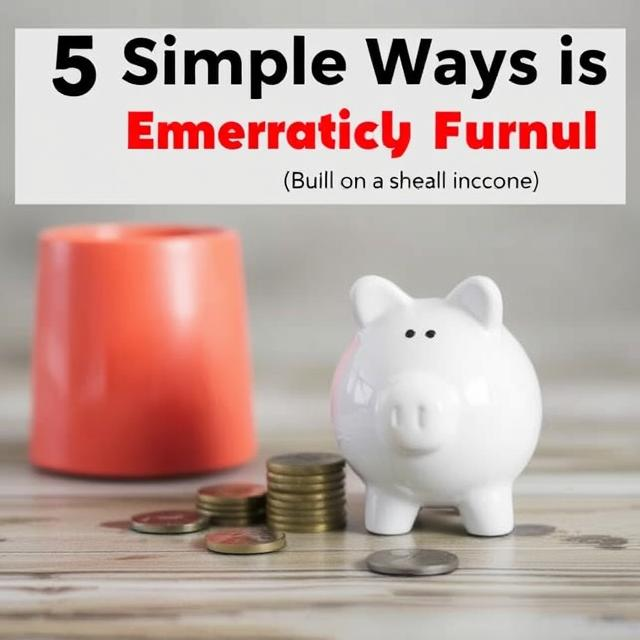5 Simple Ways to Build an Emergency Fund (Even on a Small Income)

Introduction
An emergency fund is one of the most important financial tools you can have—especially if you’re living on a small income. It acts as a safety net, providing peace of mind in case of unexpected expenses like car repairs, medical bills, or even a sudden job loss. But how do you build an emergency fund when money feels tight? In this post, we’ll walk you through 5 simple ways you can start building your emergency fund—no matter what your income looks like.
Why You Need an Emergency Fund
Life is unpredictable, and having an emergency fund helps cushion the blow when life throws you a curveball. Whether it’s an unplanned medical expense, a leaky roof, or a job layoff, your emergency fund gives you the financial security to face these challenges head-on. Plus, it keeps you from going into debt when life gets complicated.
1. Start Small, Build Gradually
You don’t need to have a huge sum saved up right away. In fact, the first step is just to get started, no matter how small. Aim for a mini emergency fund of $500 to $1,000. This is enough to cover many common emergencies and will give you confidence to continue building it over time.
Tip: Start by setting aside even $25 or $50 a month. It’s about consistency, not perfection. Small contributions add up over time!
2. Automate Your Savings
One of the easiest ways to save for an emergency fund is to automate it. Set up an automatic transfer from your checking account to your savings account every time you get paid. This way, the money is saved before you even have a chance to spend it.
Pro Tip: Treat your savings like a non-negotiable expense—just like rent or utilities. The more automatic it is, the less tempting it will be to dip into the fund.
3. Cut Back on Non-Essential Spending
To build an emergency fund, you may need to make some temporary sacrifices. Look at your monthly spending and identify areas where you can cut back. For example, can you reduce your dining out budget or cancel a subscription service you rarely use? It’s all about finding creative ways to save small amounts that can add up quickly.
Budgeting Tip: If you’re finding it hard to cut back on big expenses, start with small, recurring costs like your daily coffee or weekly takeout. Every little bit counts.
4. Find Extra Income Streams
Sometimes, finding extra income is the fastest way to build an emergency fund. Consider side gigs, freelance work, or even selling things you no longer need. Websites like Fiverr, Upwork, or eBay offer platforms for earning extra cash with little upfront investment.
Extra Cash Tip: Even something small, like babysitting, dog walking, or doing odd jobs for neighbors, can make a huge difference in growing your emergency fund.
5. Use Windfalls Wisely
If you get a tax refund, a work bonus, or a cash gift, don’t splurge it all away. Instead, put a portion of it into your emergency fund. Windfalls are an excellent opportunity to give your savings a boost and reach your emergency fund goal faster.
Smart Tip: Even putting 50% of a windfall into your emergency fund will get you closer to your goal without affecting your lifestyle too much.
How Much Should Your Emergency Fund Be?
Your emergency fund should ideally cover 3 to 6 months’ worth of living expenses. This might sound like a lot, but remember, building your fund gradually is the key. Start with smaller amounts and keep adding to it over time.
Here’s how to calculate your goal:
- Add up all your essential monthly expenses (e.g., rent, utilities, groceries, insurance).
- Multiply that amount by 3 to 6 months.
- That’s your target range for your emergency fund.
Conclusion
Building an emergency fund on a small income is absolutely possible with a little discipline and consistency. Start small, automate your savings, and look for ways to reduce non-essential spending. Even a modest emergency fund can make a huge difference when unexpected expenses pop up. Stay committed, and soon you’ll have the financial cushion you need to navigate life’s surprises.



